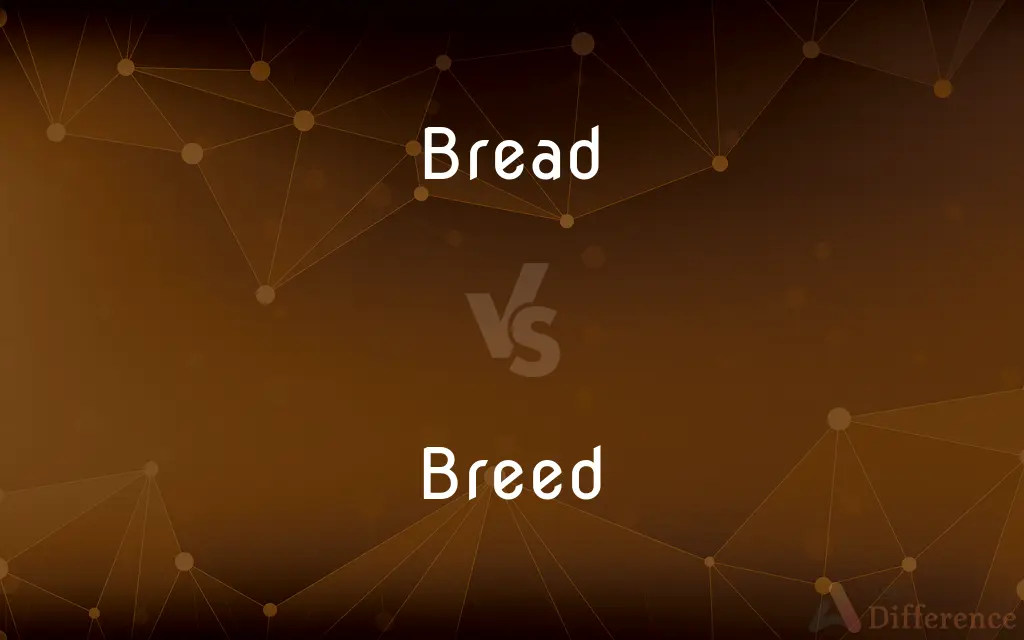Bread vs. Breed — What's the Difference?
By Tayyaba Rehman & Urooj Arif — Updated on March 11, 2024
Bread is a staple food made from a dough of flour and water, often baked, while breed refers to a specific genetic lineage or variety of animals or plants.

Difference Between Bread and Breed
Table of Contents
ADVERTISEMENT
Key Differences
Bread is primarily a food product, essential in many cultures' diets, made by baking a mixture of flour, water, and often yeast. Whereas breed is a term used in biology and agriculture, denoting a particular strain or genetic form of animals or plants, distinguished by specific characteristics.
Bread's variety comes from different ingredients, methods of preparation, and baking, leading to a wide range of flavors, textures, and shapes. On the other hand, breeds vary due to genetic differences, selective breeding, and adaptation to environments, resulting in distinct physical and behavioral traits.
Bread plays a significant role in human nutrition, providing carbohydrates, fibers, and in some cases, proteins and vitamins, especially when made with whole grains. Whereas, the importance of breeds lies in biodiversity, agricultural productivity, and the ability to meet specific human needs, such as companionship, labor, or dietary preferences.
The making of bread can be traced back thousands of years, evolving with human civilization, and reflects cultural and regional differences. On the other hand, the concept of breeding has been practiced for millennia, initially through natural selection, and later through more systematic and scientific methods.
Bread's significance extends beyond nutrition, serving as a cultural and social symbol in many traditions, often associated with hospitality and sharing. Breeds, however, contribute to cultural heritage and identity, particularly in the context of domesticated animals, and can be a point of pride and tradition in agricultural and pet-keeping communities.
ADVERTISEMENT
Comparison Chart
Definition
A baked food product made from flour and water.
A specific genetic lineage of animals or plants.
Primary Use
Nutrition and sustenance.
Classification, selective breeding, and preservation of genetic traits.
Variety Basis
Ingredients, preparation methods, and baking techniques.
Genetic characteristics and lineage.
Significance
Cultural, nutritional, and social.
Biodiversity, agricultural productivity, and cultural heritage.
Historical Role
Evolved with human civilization, reflecting regional and cultural diversity.
Practiced through natural selection and later through systematic breeding, impacting agricultural and pet cultures.
Compare with Definitions
Bread
A basic food made by baking a dough of flour and water.
Sourdough bread is made using a natural yeast culture.
Breed
A specific genetic group of animals within a species.
The Labrador Retriever is a breed of dog known for its friendly nature.
Bread
A symbol of sustenance and life in many cultures.
Breaking bread is an act of peace and community.
Breed
Used in agriculture and pet-keeping to denote lineage.
Jersey cows are a breed known for their high-quality milk.
Bread
A diverse food category with many varieties.
Baguettes, a type of French bread, are known for their crisp crust.
Breed
Reflects biodiversity and adaptation.
The Arabian horse breed is renowned for its endurance and speed.
Bread
An essential component of many diets worldwide.
In many countries, bread is eaten with every meal.
Breed
Subject to selective breeding for desired traits.
Sheep breeds are often selected for wool quality.
Bread
A culinary art that involves baking.
Baking bread is both a science and an art due to its precise measurements and creative shapes.
Breed
Can refer to plant varieties developed for specific characteristics.
Heirloom tomato breeds are prized for their flavors.
Bread
Bread is a staple food prepared from a dough of flour and water, usually by baking. Throughout recorded history, it has been a prominent food in large parts of the world.
Breed
A breed is a specific group of domestic animals having homogeneous appearance (phenotype), homogeneous behavior, and/or other characteristics that distinguish it from other organisms of the same species. In literature, there exist several slightly deviating definitions.
Bread
A staple food made from flour or meal mixed with other dry and liquid ingredients, usually combined with a leavening agent, and kneaded, shaped into loaves, and baked.
Breed
To produce (offspring); give birth to or hatch.
Bread
Food in general, regarded as necessary for sustaining life
"If bread is the first necessity of life, recreation is a close second" (Edward Bellamy).
Breed
To bring about; engender
"Admission of guilt tends to breed public sympathy" (Jonathan Alter).
Bread
Something that nourishes; sustenance
"My bread shall be the anguish of my mind" (Edmund Spenser).
Breed
To cause to reproduce, especially by controlled mating and selection
Breed cattle.
Bread
Means of support; livelihood
Earn one's bread.
Breed
To develop new or improved strains in (organisms), chiefly through controlled mating and selection of offspring for desirable traits.
Bread
(Slang) Money.
Breed
To inseminate or impregnate; mate with.
Bread
To coat with bread crumbs, as before cooking
Breaded the fish fillets.
Breed
To rear or train; bring up
A writer who was bred in a seafaring culture.
Bread
(uncountable)
Breed
To be the place of origin of
Austria breeds great skiers.
Bread
A foodstuff made by baking dough made from cereals.
We made sandwiches with the bread we bought from the bakery.
Any leftover bread can be put into the pudding.
Breed
To produce (fissionable material) in a breeder reactor.
Bread
Food; sustenance; support of life, in general.
Breed
To produce offspring.
Bread
(countable) Any variety of bread.
Breed
To copulate; mate.
Bread
Money.
Breed
To originate and develop
Mischief breeds in bored minds.
Bread
Breadth.
Breed
A group of organisms having common ancestors and certain distinguishable characteristics, especially a group within a species developed by artificial selection and maintained by controlled propagation.
Bread
A piece of embroidery; a braid.
Breed
A kind; a sort
A new breed of politician.
A new breed of computer.
Bread
(transitive) To coat with breadcrumbs.
Breaded fish
Breed
(Offensive) A person of mixed racial descent; a half-breed.
Bread
To make broad; spread.
Breed
(transitive) To give birth to; to be the native place of.
A pond breeds fish; a northern country breeds stout men
Bread
(transitive) To form in meshes; net.
Breed
Of animals, to mate.
Bread
To spread.
Breed
To keep animals and have them reproduce in a way that improves the next generation’s qualities.
Bread
To cover with bread crumbs, preparatory to cooking; as, breaded cutlets.
Breed
To arrange the mating of specific animals.
She wanted to breed her cow to the neighbor's registered bull.
Bread
An article of food made from flour or meal by moistening, kneading, and baking.
Breed
To propagate or grow plants trying to give them certain qualities.
He tries to breed blue roses.
Bread
Food; sustenance; support of life, in general.
Give us this day our daily bread.
Breed
To take care of in infancy and through childhood; to bring up.
Bread
Food made from dough of flour or meal and usually raised with yeast or baking powder and then baked
Breed
To yield or result in.
Disaster breeds famine;
Familiarity breeds contempt
Bread
Informal terms for money
Breed
To be formed in the parent or dam; to be generated, or to grow, like young before birth.
Bread
Cover with bread crumbs;
Bread the pork chops before frying them
Breed
(sometimes as breed up) To educate; to instruct; to bring up
Breed
To produce or obtain by any natural process.
Breed
(intransitive) To have birth; to be produced, developed or multiplied.
Breed
(transitive) to ejaculate inside someone's anus
Breed
All animals or plants of the same species or subspecies.
A breed of tulip
A breed of animal
Breed
A race or lineage; offspring or issue.
Breed
(informal) A group of people with shared characteristics.
People who were taught classical Greek and Latin at school are a dying breed.
Breed
To produce as offspring; to bring forth; to bear; to procreate; to generate; to beget; to hatch.
Yet every mother breeds not sons alike.
If the sun breed maggots in a dead dog.
Breed
To take care of in infancy, and through the age of youth; to bring up; to nurse and foster.
To bring thee forth with pain, with care to breed.
Born and bred on the verge of the wilderness.
Breed
To educate; to instruct; to form by education; to train; - sometimes followed by up.
But no care was taken to breed him a Protestant.
His farm may not remove his children too far from him, or the trade he breeds them up in.
Breed
To engender; to cause; to occasion; to originate; to produce; as, to breed a storm; to breed disease.
Lest the placeAnd my quaint habits breed astonishment.
Breed
To give birth to; to be the native place of; as, a pond breeds fish; a northern country breeds stout men.
Breed
To raise, as any kind of stock.
Breed
To produce or obtain by any natural process.
Children would breed their teeth with less danger.
Breed
To bear and nourish young; to reproduce or multiply itself; to be pregnant.
That they breed abundantly in the earth.
The mother had never bred before.
Ant. Is your gold and silver ewes and rams?Shy. I can not tell. I make it breed as fast.
Breed
To be formed in the parent or dam; to be generated, or to grow, as young before birth.
Breed
To have birth; to be produced or multiplied.
Heavens rain graceOn that which breeds between them.
Breed
To raise a breed; to get progeny.
The kind of animal which you wish to breed from.
Breed
A race or variety of men or other animals (or of plants), perpetuating its special or distinctive characteristics by inheritance.
Twice fifteen thousand hearts of England's breed.
Greyhounds of the best breed.
Breed
Class; sort; kind; - of men, things, or qualities.
Are these the breed of wits so wondered at?
This courtesy is not of the right breed.
Breed
A number produced at once; a brood.
Breed
A special lineage;
A breed of Americans
Breed
A special variety of domesticated animals within a species;
He experimented on a particular breed of white rats
He created a new strain of sheep
Breed
Half-caste offspring of parents of different races (especially of white and Indian parents)
Breed
A lineage or race of people
Breed
Call forth
Breed
Copulate with a female, used especially of horses;
The horse covers the mare
Breed
Of plants or animals;
She breeds dogs
Breed
Have young (animals);
Pandas rarely breed in captivity
Common Curiosities
How do breeds differ from each other?
Breeds differ from each other in their genetic makeup, leading to variations in physical and behavioral traits.
Is bread consumption universal?
Bread consumption is widespread but varies in form and importance across different cultures.
Can bread vary in taste and texture?
Yes, bread can vary widely in taste and texture based on ingredients, preparation, and baking methods.
Is gluten always present in bread?
Gluten is present in breads made from wheat, barley, and rye, but gluten-free options exist.
Why are specific breeds important in agriculture?
Specific breeds are important in agriculture for their adapted traits, such as yield, disease resistance, and climate adaptability.
Are all breeds of animals domesticated?
Most recognized breeds are domesticated, although wild species can have populations with distinct genetic traits.
How does selective breeding affect breeds?
Selective breeding shapes breeds by emphasizing desirable traits, which can enhance productivity, appearance, or temperament.
What is the primary purpose of bread?
The primary purpose of bread is to serve as a staple food, providing nutrition and energy.
What are some common types of bread?
Common types of bread include white, whole wheat, sourdough, rye, and baguette.
Can bread be made without yeast?
Yes, bread can be made without yeast, using leavening agents like baking soda or through unleavened methods.
What role do breeds play in biodiversity?
Breeds contribute to biodiversity by maintaining genetic diversity within and among species.
What is artisan bread?
Artisan bread refers to breads made using traditional methods, often with high-quality, natural ingredients.
How do environmental conditions affect breeds?
Environmental conditions can influence breed development and suitability, impacting factors like size, coat, and behavior.
Can breeds become extinct?
Yes, breeds can become extinct without conservation efforts, losing unique genetic traits.
What is the significance of whole grain in bread?
Whole grain in bread enhances nutritional value, providing more fiber, vitamins, and minerals.
Share Your Discovery

Previous Comparison
Equitable vs. Fair
Next Comparison
Delicious vs. TastyAuthor Spotlight
Written by
Tayyaba RehmanTayyaba Rehman is a distinguished writer, currently serving as a primary contributor to askdifference.com. As a researcher in semantics and etymology, Tayyaba's passion for the complexity of languages and their distinctions has found a perfect home on the platform. Tayyaba delves into the intricacies of language, distinguishing between commonly confused words and phrases, thereby providing clarity for readers worldwide.
Co-written by
Urooj ArifUrooj is a skilled content writer at Ask Difference, known for her exceptional ability to simplify complex topics into engaging and informative content. With a passion for research and a flair for clear, concise writing, she consistently delivers articles that resonate with our diverse audience.














































